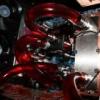*Core 2 duo- E8200 (2.66 Gig)
*INTEL DG33BUC MB.
*2 GB DDR-II 800 single module RAM
*512 MB DDR 2 Nvidia PCI graphic card
*160 GB HDD SEA Gate
*Win XP Professional SP2
Problem-
When I try adding extra 2 GB RAM module of the same type/speed to the DIMM 0 or DIMM 1 slot,
the sound in XP start up cracks a bit and the system becomes slightly sluggish. Each 2 GB module
works fine singularly. But not when installed together to make total RAM 4 GB. What should be done?
I know XP 32 Bit is capable of handling 4 GB memory. Then why do I still have this issue?
Thanks
















 Sign In
Sign In Create Account
Create Account

